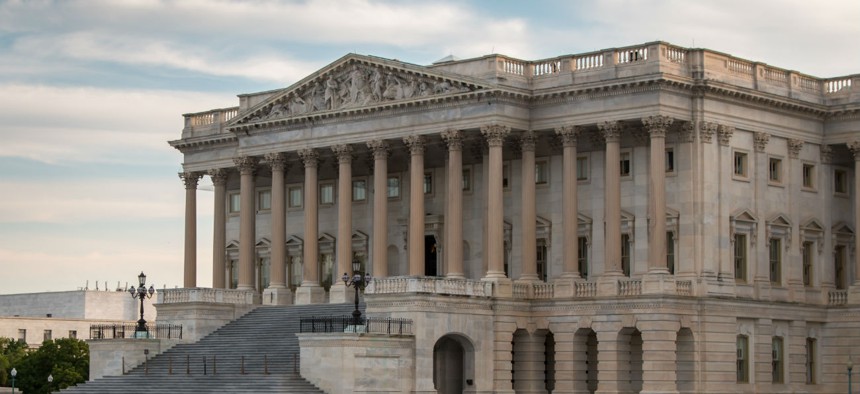
By PorqueNo Studios / Shutterstock.com
House to Consider Blocking OPM Merger, Other Workforce Proposals Through Defense Policy Bill
Proposed amendments to the annual must-pass Defense authorization bill include measures to safeguard federal workers’ insurance during shutdowns, ban the box in federal hiring and protect whistleblowers.
The House is slated to consider a number of proposals impacting the federal workforce when it begins debate Wednesday on the fiscal 2020 Defense authorization bill, among them another effort to block the Trump administration’s plan to merge the Office of Personnel Management and the General Services Administration.
Lawmakers have filed more than 400 amendments to the fiscal 2020 National Defense Authorization Act (H.R. 2500). Although most pertain to the Defense Department, several apply to a variety of other agencies. Each year, the must-pass bill is a common vehicle by which members of Congress try to advance other priorities.
The House has already passed an appropriations package that would block federal funds from being used to implement the OPM-GSA merger, which has drawn bipartisan skepticism, as well as furloughs and layoffs that were floated briefly if Congress did not embrace the reorganization proposal. The authorization bill amendment, introduced by Virginia Democratic Reps. Gerry Connolly and Don Beyer, and Del. Eleanor Holmes Norton, D-D.C., appears to go further than the language in the appropriations bill, blocking federal officials from taking “any action” to transfer OPM’s responsibilities to GSA or the Office of Management and Budget.
The House had not yet voted on the amendment as of Wednesday afternoon. OPM officials have said that although the merger requires legislation to complete, elements of the plan can—and will—be implemented administratively.
Another measure up for consideration as part of the Defense authorization bill is an amendment that would protect federal workers’ health insurance benefits in the event of a government shutdown.
Currently, enrollees in the Federal Employees Dental and Vision Insurance Program and the Federal Long Term Care Insurance Program are billed directly if a lapse in appropriations extends past two pay periods, and insurers can cut off coverage for nonpayment. Additionally, during the 45-day partial government shutdown, some feds were unable to make changes to their Federal Employees Health Benefits Program coverage to accommodate significant life events like the birth of a child, because the employees who process such changes were furloughed.
The amendment by Rep. Katherine Clark, D-Mass., mirrors legislation advanced by the House Oversight and Reform Committee last month that would ensure human resources employees responsible for insurance changes are excepted from shutdown furloughs, and end the practice of billing feds directly for FEDVIP and FLTCIP during lapses.
Rep. Elijah Cummings, D-Md., has also filed an authorization bill amendment that includes the language of the Fair Chance Act (H.R. 1076), which codifies the federal government’s policy not to ask federal job candidates about past criminal convictions until making a conditional offer of employment. It also would expand the policy to apply to federal contractors. That bill was approved by the House Oversight and Reform Committee in March.
Another bill out of the House Oversight and Reform Committee that’s up for insertion into the Defense authorization bill is one that would provide temporary relief to whistleblowers with cases before the Merit Systems Protection Board while the body lacks confirmed members. The amendment, filed by Connolly, would allow the MSPB general counsel to issue interim stays to protect federal workers from adverse personnel actions when the Senate has not confirmed board members, as has been the case since the end of March.
A final vote on the fiscal 2020 Defense authorization act is not expected until later this week.
NEXT STORY: Viewpoint: Alex Acosta’s Legacy







